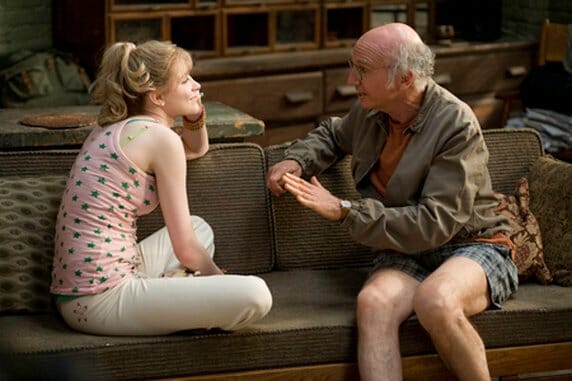
Release Date: June 19
Director: Woody Allen
Writer: Woody Allen
Cinematographer: Harris Savides
Starring: Larry David, Evan Rachel Wood, Patricia Clarkson
Studio/Run Time: Sony Pictures Classics, 92 mins.
Throwaway comedy from Woody Allen still has funny jokes
Woody Allen’s yearly release schedule has produced both gems and clunkers, and his latest is certainly in the lesser bunch. So this may seem like a strange time to realize that I’ve developed a grudging respect for Allen and his methods. While some reviewers may observe that two of every three jokes fall flat, I’m a little bit amazed that Allen would toss that one good third into such a sloppy story, like a fistful of prized truffles whisked quickly into a pan of Tuna Helper.
While other artists might gather jokes and ideas over a longer period, prune the duds, and wait for a critical mass, Allen seems to use an alarm clock to tell him when to send his latest draft from the typewriter to the actors. But a lackluster Allen film, because it’s a momentary and fleeting snapshot of the filmmaker’s microscopic progress since his last outing, just underscores what a happy, equally fleeting occurrence the good ones are. He follows the schedule of a craftsman but experiences the intermittent flash of an artist, and while the steady appearance of the former frustrates those who are hoping for the latter, as a process it works. It works for Bob Dylan, it works for Woody Allen. And as the title says, whatever works.
This year, Larry David and Evan Rachel Wood are Boris and Melodie, an unlikely October-April couple. He’s a neurotic hypochondriac and self-proclaimed genius Scrooge who punctuates his sentences with “imbecile” and “spare me”. And she’s the aforementioned imbecile. She wanders into his life like a lost puppy, appearing outside his apartment asking for money and hailing, it seems, from some long lost rural South. But she’s sweet, pretty, impressionable, and best of all, reverent toward the genius—so they hook up. From Boris’ perspective, once he warms to her, they make a pretty great couple. He compares her to the “idiot” Benjy from Faulkner’s The Sound and the Fury, and she offers a vacant non-response, as if he just smiled at the horizon. It’s a win-win.
Boris is the stand-in for Woody Allen, and his rants at the “inchworms” that surround him are often funny, even though they’re hampered by David’s perpetual smirk. With raised eyebrows, he seems more tickled than exasperated to be speaking Allen’s exasperating dialogue. I like David, but it’s hard not to imagine—and prefer—the Woody Allen of two decades ago playing the role, or even Jason Alexander, who was David’s alter-ego on Seinfeld.
But that very interplay of images from the past and present, from life and fiction, or from this fiction and some previous fiction, is an odd, compelling, and consistent part of Allen’s films. The quality fluctuates but the obsessions don’t. Even in a throwaway obligation like Whatever Works, Allen’s personal life as we know it provides the source material (just as David’s does for his TV shows), and he seems ever willing to crack open his persona, to poke fun at the aging man’s fantasy that we could easily and lazily assume is his own. A close-up of David’s serious face late in the film is the one tender turn, mostly because Boris seems to be thinking something other than what he’s saying.
When Melodie’s mother (Patricia Clarkson) ventures north in search of her daughter, she discovers that Melodie is “living like a sharecropper,” revealing another strange corner of Allen’s universe. It’s one thing to disparage religious, right-wing Southern rubes but it’s another to transport them from decades past—when “sharecropper” still had bite, when the local beauty pageant had more appeal than American Idol—drop them into New York, and pretend that the magic of urban sophistication can bring out their freer, sexier selves. The hyper caricatures and the casual inaccuracies shift the point of the satire away from the rubes and toward the sophisticates, who myopically believe in New York as the center of the universe, Allen himself among them.
Nubile Melodie eventually captures more eyes than just the two in Boris’ head. She says she’s pretty sure it’s mathematically impossible for her to be in two dreams at once, but oh, how wrong she is. Like the myriad dreams in which the girl walks, Allen’s film is a merged picture of overlapping fantasies, and the competing ideas don’t altogether harmonize. But it’s all disposable, and the next one will start with a fresh page, a clean take on the same preoccupations. And given the slapdash nature of Whatever Works, that’s surely a good thing.